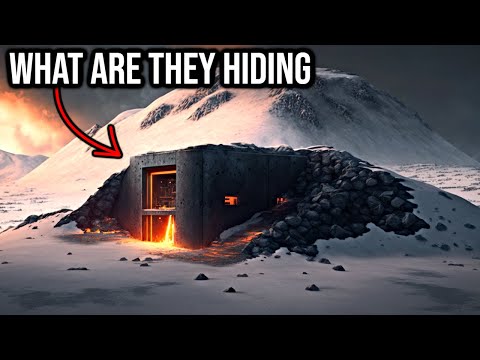
3 Minutes Ago: Russia Reveal Something Hidden in Alaska.
message strange truth world news current events 2023 today this week this month
Located at the northwest extremity of the continental United States, most of Alaska Falls inside the Arctic Circle. And with the least amount of population density in the entire country, most of Alaska’s north is icy and uninhabited, with places still shrouded in mystery. To most people, it looks otherworldly and alien, barren and lifeless. But those thick sheets of glacial ice contained some of the most intriguing mysteries of our planet and.
Recently, scientists found something very interesting that might have a big consequence for our planet. Some of those layers of ice were formed during the last Ice Age, almost 3,000,000 years ago, and since ice can trap objects and preserve them for centuries, just imagine what could be discovered beneath those layers. There are thousands of time capsules buried under Alaska’s ice waiting to be discovered. One such discovery that has recently raised interest among the general populace is the discovery of microbial life thousands of years old, thriving under the permafrost, which is a technical term.
It describes layers of ice that remains frozen for years, either Overground or water. In 2019, a team of researchers from the University of Michigan found something strange under ice in Barrow, which is the northernmost city in Alaska. After digging more than 12 feet, they found a rich community of microbes living in these ancient cryo packs. These cryo pegs are pockets of unfrozen seawater brines where freezing is prevented due to the high salinity and the presence of dissolved solids in the surrounding seawater trapped under the permafrost for up to 50,000.
Is these marine bacteria not only managed to survive but also flourish in an isolated salty and cold environment? The saline content in some of these pockets are over 14%, which is enough to kill any kind of microbes in our modern day canned goods. However, these microbes seem to survive in these extremely harsh conditions. This find has got the scientific community very excited about finding life on other extreme places like Mars or Saturn’s icy moon Titan, which has a deep ocean beneath its icy shell that might resemble the deep sea on earth, where life can persist continually.
However, this discovery in Alaska has also worried a lot of scientists. The fear is that as climate change slowly melts the Alaskan permafrost soils that have been frozen for thousands of years, they may release ancient viruses and bacteria that, having lain dormant for millennia, can suddenly spring into life and spread, causing havoc. Over the centuries, humans have existed side by side with bacteria and viruses, and we’ve evolved to resist them. However, what would happen if we were to suddenly be exposed to deadly bacteria and viruses that have been absent for thousands of years or that we’ve never met before?
Especially in the current condition, where the entire planet is realizing the amount of havoc a new strain of virus can cause to our entire population, this fright is quite legitimate. In fact, there is previous evidence to support. His theory in August 2016, in a remote corner of a Siberian tundra called the Yamal Peninsula in the Arctic Circle, a 12 year old boy died and at least 20 people were hospitalised after being infected by anthrax. It was later found out that over 75 years ago, a reindeer infected with anthrax died and its frozen carcass became trapped under a layer of permafrost.
Find more https://www.youtube.com/playlist?list=PLtoSlPOzD0YVfMGRnaVWqnOc1Af_tp2kI
SUBSCRIBE to @-anonymous for more – https://www.youtube.com/anonymous
WEBSITE – https://anon.news
FACEBOOK – https://facebook.com/anonymousdirect
INSTAGRAM – https://instagram.com/anonymous
TWITTER – https://twitter.com/anonymousOfcl
Please SHARE this as widely as you feel drawn…
Content licensed in part by CTD Clip Licensing Group.